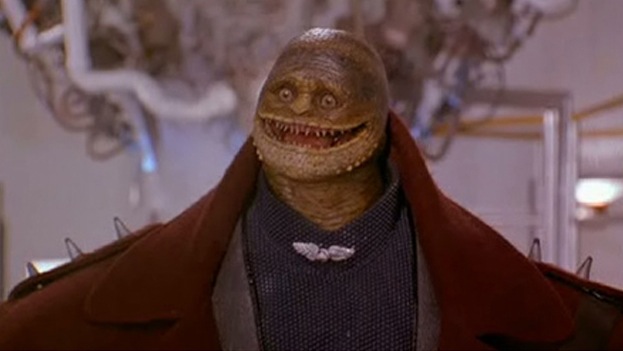Today is the 20th anniversary of Super Mario Bros. Not the game, the movie. Hindsight being 20/20 and all, no one would say a Super Mario Bros. movie should have ever been made. Within the film's first minutes, viewers have to suspend any knowledge of the princess-saving plumber's exploits and instead buy into an alternate dimension where King Koopa rules Dinohattan after the meteor that wiped out the dinosaurs actually just pushed a bunch of them into an alternate dimension.
What the fuck were they smoking?
Super Mario Bros. (the game) is about jumping, hitting blocks with your head, and squishing monsters under your boot. While the $48 million flick only brought in $20 million at the box office and sounded a warning for others to come, there have been tons of subsequent flops in the two decades following Bob Hoskins' turn as the mustachio'd plumber. Like nearly every video game adapted to film, producers, directors, script writers and studio heads had their lascivious way with our beloved brothers, tweaking the license to fit "their" audience, all while counting on the gaming public to fill opening-weekend seats.
Hollywood's failed at every turn to churn out a decent video game adaptation (although video games have certainly had their effect on movies. Look no further than last summer's The Amazing Spider-Man and that film's first-person sequences). How about 1994's Street Fighter?
Currently the proud owner of a 13% rating on Rotten Tomatoes, Street Fighter cast action movie heavyweights like Jean-Claude Van Damme in corny, disjointed plots. (And since when is Guile the hero of Street Fighter?) Only one month later, the first Mortal Kombat movie debuted to similarly bad reviews. Both made profits at the box office, but it wasn't until 1999 that another franchise headed to theaters and renewed moviegoer disgust with video game adaptations.
Wing Commander cast Freddie Prinze Jr. in a lead role, but with gamers having moved beyond adventure games, name-recognition did nothing but further the damage critics had already inflicted. That film enjoys an 11% rating on Rotten Tomatoes. Of course in 2001, buxom Lara Croft got her own series of films and reignited the dollar signs that had previously fluttered around the heads of studio executives everywhere.
Despite its 19% Rotten Tomatoes rating, Angelina Jolie and company pulled in several hundred million dollars at the box office, kicking off a decade of renewed interest in video game adaptations. Resident Evil also started a franchise of Hollywood blockbusters, despite none of the films (all the way through to 2012's Resident Evil: Retribution) garnering above the first film's 34% on Rotten Tomatoes.
Even Final Fantasy got a movie all its own in the summer of 2011. With a budget of $137 million, Columbia and Square took a $50 million loss in the name of cutting-edge computer graphics and a total lack of humanity on screen. Sure, some video game adaptations have raked in cash.
You can't argue with $100 million dollars in profits for 2010's Prince of Persia movie or even the $50 million Max Payne made at the box office. That doesn't mean those movies were any good. In fact video game movies have pretty consistently made critics and audiences cough up a little movie-theater popcorn in disgust.
There's a point in the first 20 minutes of Super Mario Bros. where Luigi, played by John Leguizamo, calls back to The Wizard of Oz. "I got a feeling we're not in Brooklyn anymore." Mario and Luigi never went to fucking Brooklyn in the video game. What the hell were they doing there in the film?
Think about it this way. In order to turn a video game into a movie, you have to completely redefine the visuals, strip it of its interactivity and player agency, and then you have to market to an audience that never fucking played the game in the first place.
Why bother? Why not just let games be games, let movies be movies? Because people are greedy. You have publishers looking to sell their properties to the highest bidder, you have slimey studio executives looking to bank off of the hottest video games, and no one is looking out for the brand's best interests. They're only looking out for themselves, their share holders, the almighty dollar.
In fact, I think Super Mario Bros. captured this perfectly. Except… we in the audience don't get to put on the hydraulic boots, save the princess, and escape from this shithole those people in suits dreamt up. We just get to leave the theater, dejected and abused… a few hundred Koopa Coins poorer.







